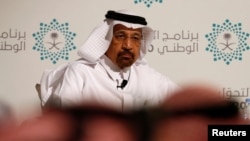Saudi Arabia on Tuesday unveiled the details of the first phase of an economic overhaul aimed at reducing reliance on oil exports and preparing for the millions of young people who will be seeking jobs and affordable housing in the coming years.
The National Transformation Plan (NTP) was approved by the Saudi Cabinet late Monday. Hundreds of the NTP's targets were detailed in a 114-page document distributed to journalists on Tuesday.
Key targets include creating 450,000 new jobs outside the public sector by 2020 and cutting expenditure on public wages from 45 to 40 percent of the state budget.
Currently, 70 percent of Saudis work in the public sector. Nearly half of last year's spending, or around $120 billion (450 billion riyals), went to wages, salaries and allowances.
More than half of Saudis are under the age of 25. Unemployment is currently at 11.7 percent, though the government wants to reduce that to 7 percent by 2030. The NTP outlined plans to provide thousands more low-income families with housing.
Young people's frustration at their lack of prospects was a key driver of the Arab Spring uprisings that rocked the Middle East in 2011. Though Saudi Arabia did not experience any major upheaval at that time, the plunge in oil prices over the past two years has exposed it to urgent domestic challenges. Lower oil prices pushed Saudi Arabia into a nearly $100 billion budget deficit last year.
King Salman's 30-year-old son, Deputy Crown Prince Mohammed bin Salman, has been spearheading the effort to diversify the economy since he was appointed as second-in-line to the throne and chair of a committee that oversees economic policymaking last year. That committee, the Council on Economic and Development Affairs, has been focused on reorienting the OPEC kingdom away from its decades-long reliance on oil, creating jobs and boosting foreign investment.
The NTP is part of a wider Vision 2030 plan that includes a proposal to float a stake in the world's largest oil company, Saudi Arabian Oil Co., and set up one of the world's biggest government investment funds.
The NTP has also set a target of raising non-oil state revenue from around 164 billion riyals ($43.7 billion) to 530 billion riyals ($141 billion) by 2020. To achieve that, the NTP aims to increase non-oil exports by 145 billion riyals ($38.7 billion), more than double direct foreign investment to reach 70 billion riyals ($18.7 billion), and slash energy and water subsidies by 200 billion riyals ($53 billion).
The kingdom has had to dig into its foreign reserves to spend on its many infrastructure projects, generous subsidies, millions of public sector jobs, and free healthcare and education for citizens. To cover the difference between spending and revenue, Saudi Arabia has drawn down its foreign reserves from $728 billion at the end of 2014 to around $572 billion in April.









